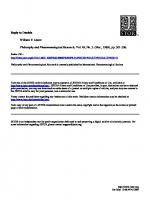
- Author / Uploaded
- Putnam Hilary
Reply to Two Realists
Hilary Putnam The Journal of Philosophy, Vol. 79, No. 10, Seventy-Ninth Annual Meeting of the American Philosophical As
825 23 68KB
Pages 4 Page size 595 x 792 pts Year 2007
Recommend Papers
File loading please wait...
Citation preview
Reply to Two Realists Hilary Putnam The Journal of Philosophy, Vol. 79, No. 10, Seventy-Ninth Annual Meeting of the American Philosophical Association Eastern Division. (Oct., 1982), pp. 575-577. Stable URL: http://links.jstor.org/sici?sici=0022-362X%28198210%2979%3A10%3C575%3ARTTR%3E2.0.CO%3B2-A The Journal of Philosophy is currently published by Journal of Philosophy, Inc..
Your use of the JSTOR archive indicates your acceptance of JSTOR's Terms and Conditions of Use, available at http://www.jstor.org/about/terms.html. JSTOR's Terms and Conditions of Use provides, in part, that unless you have obtained prior permission, you may not download an entire issue of a journal or multiple copies of articles, and you may use content in the JSTOR archive only for your personal, non-commercial use. Please contact the publisher regarding any further use of this work. Publisher contact information may be obtained at http://www.jstor.org/journals/jphil.html. Each copy of any part of a JSTOR transmission must contain the same copyright notice that appears on the screen or printed page of such transmission.
JSTOR is an independent not-for-profit organization dedicated to and preserving a digital archive of scholarly journals. For more information regarding JSTOR, please contact [email protected].
http://www.jstor.org Sun Jun 17 04:45:03 2007
575
RE,-\SON, T R U T H A N D H I S T O R Y
thing goes." In particular, given a n y consistent view, be it the ideal result of rational inquiry or not, there will be a way to interpret the language of the view so that the view comes out true, including all statements of constraints o n interpretation contained in the view. I take it Putnam would not suppose this is a good argument for the conclusion that truth is the same thing as consistency! But then Putnam's argument does not show that truth is a n idealization of rational acceptance, either. So, I d o not see that Putnam here provides any serious objection to a view that accepts moral relativism while rejecting rationality relativism, although I may not fully understand his argument. L I L B k R T HARXIAN
Princeton University
REPLY T O T W O REALISTSX Hartry Field's criticisms seem to me, for the most part, to be based on confusions. For example, suppose metaphysical realism is true. T h e n there is a definite set I of individuals of which the world consists (in the world-picture of Field's Science w i t h o u t N u m b e r s , these would be just the space-time points). And there is a definite set P of all properties a n d relations of these individuals. Consider a "language" with a name for each member of I a n d a predicate for each mernber of P. Such a language is not a denumerable language; true. But there is n o reason for a metaphysical realist to think that the true a n d complete theory of the world s h o u l d be expressible i n a d e n u m e r a b l e language. T h i s language is unique ( u p to isomorphism), and the theory of the world-the set of true sentences-is likewise unique. So there is nothing wrong with the assertion (which Field spends pages i n criticizing) that, on a metaphysical realist view, there is "one true theory." Metaphysical realists have always thought i n terms of a n ideal language, not a natural one, with its vagueness, its finite vocabulary, etc. T h e most substantive-but also the most amazing-idea i n Field's paper is the suggestion that a realist can also be a disquotationalist. I shall argue that a disquotational theory can have n o explanatory *.ihstract of a paper to he read in .AP.A symposium o n Hilary Putnam's R r a s o n , T r u t h and Hzstory, commenting o n papers by Hartry Field a n d Gilbert Harman; see this J O I . R K A I . , this issue, 553-567 and 568-575, respectivel\. 0022-362X 82 7910 0575SOO 50
1982 T h e Journnl of Philosophb, Inc
576
T H E JOURNAL OF PHILOSOPHY
power unless something is said about the notion of assertion. (This is so because disquotational theories presuppose that our understanding of 'true'-and, indeed, of any word-comes about through the internalization of assertibility conditions and not through the learning of truth conditions in the realist sense. If "asserting" P is merely uttering P, then the theory, in effect, denies that our thoughts and assertions are thoughts and assertions. If "assertion" is to be taken in a suitably "thick" sense, however, then we have to recognize that assertions are correct and incorrect. But then the problem of truth reappears when we ask what it is for an assertion to be correct and what it is for it to be incorrect. T h a t there are (electromagnetic) fields and that these are individual things (not sets or functions), and that these exist between particles is one theory; that there are particles and forces o n particles (where the particles are) and n o other individuals (except Goodmanian sums of these "basic" individuals) is a n incompatible theory. I have often used an example in which two such incompatible theories are equivalent in a very strong sense (not just in the sense of predicting the same trajectories, but in the sense of being mutually interpretable). Field modifies my example so that the two theories are n o t incompatible, and then says I made an error. I regret that he failed to discuss my actual example. Let me try to state the main argument of Reason, T r u t h and History (which Field and Harman avoid discussing like the plague!) briefly: I ask: what fixes R (the true reference relation, in the metaphysical realist sense, the God's-Eye-View-reference relation) as the reference relation? What singles it out? What makes it the case that the true reference relation isn't some other admissible reference relation, say, R I ~ ? Well, it can't be anything psychological. For the nonstandard but admissible reference relations can be chosen to agree o n all psychological predicates, while permuting the extensions of the nonpsychological predicates ("cat," "touches," etc.) in unimaginably perverse ways. Harman's response is that the world has a "single causal structure." But this doesn't help. For if my linguistic competence is caused by E l , E z . Ej . . . , then it is also true that it is causedX by E ?, E?, E ?, . . . (where the * denotes the corresponding entity in a suitable nonstandard model). So we can then ask, why is reference fixed by causation and not by causationx? T h e answer: "because
FRENCH RESPONSES T O SARTRE
577
that's the nature of reference" is unabashed essentialism. In the context of a twentieth-century world view, to say this is only to say that one believes i n a one-knows-not-what which solves our problem one-knows-not-how. T h e central argument of my book is that "reference" is n o more explicable by a materialist than is epistemic justification or moral goodness. T h e reply of Harman a n d Field is that it's not inconsistent (logically) to be a metaphysical realist about truth and a subjectivist about epistemic values (Field) or about moral values (Harman). T h i s is n o reply; unless Field and Harman can come u p with something better to say about reference a n d truth than disquotational theories or observations about "single causal structure," they have n o serious criticism at all to offer of the argument of Reason, Truth and History. HILARY PUTNAIL1
Harvard University
SARTRE, MERLEAU-PONTY, AND HUMAN FREEDOMY
J
ean-Paul Sartre and Maurice Merleau-Ponty are commonly recognized to have shared in defining the project of a n "existential phenomenology" which would seek to evoke and interpret primordial structures of h u m a n "being-in-the-world," of the way we "live" our relationship to the natural world, to other persons, to history a n d culture, "prior," in some sense, to the overlay of reflective thought and prior i n particular to the explanatory accounts of the special sciences. Inevitably, such a project requires a delicate balance between a recovery of hidden and unknowing experiences, o n the one hand, and some guiding, interpretive framework, which directs attention to and provides the most general concepts for understanding those experiences o n the other: the experiences should validate the broad conceptual framework, a n d the conceptual framework should disclose, and thus afford more comprehensive insight into, the fundamental experiences. Just as inevitably, therefore, differences i n the conceptual framework, as between different investigators, should be expected to yield corre* T o be presented in an APA symposium o n French Responses to Sartre: MerleauPonty a n d Levinas, December 30, 1982. Alphonso Lingis will be co-symposiast, a n d Peter Caws will comment; see this JOURNAL, this issue, 588-596 and 59617, respectively, for their contributions.
0022-362X/82/791110577$01 .OO
G
1982 T h e Journal of Philosophy, Inc.









